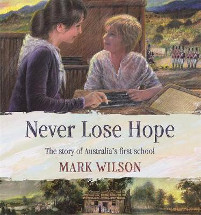Never lose hope by Mark Wilson

Lothian, 2018. ISBN 9780734416797
(Age: 5+) Recommended. Themes: Convicts, Sydney Cove, Education,
Australian history. Subtitled, The story of Australia's first
school, this evocatively illustrated picture book about the
early years of convict settlement in New South Wales, shows younger
readers the efforts of one woman, Isabella Rosson, bringing the most
basic of education to the children in the colony at Sydney Cove.
Using the colonial paintings of John Glover and Thomas Watling as a
guide, Wilson presents a view of early life in Sydney Cove that will
be easily recognised by younger readers. In each of the paintings
life in this isolated place can be seen: men fishing with nets in
the stream, bark huts - their roofs held down by lengths of timber,
Rosson's horn book - a treasured possession, the soldiers, tents and
chains. Each detail brings the lives of these early settlers closer
to the audience, as they read of John Hudson, a young convict sent
to New South Wales for stealing a shirt, and now on the run again
after stealing bread in this starving colony. Isabella finds him and
takes him into her hut to feed him and give him a place to rest. He
sees her book, and gently turns the pages, returning to watch other
children come for their lessons, leaving flowers for her, until one
day he comes inside to be part of the class, until the soldiers
finally find him and he is caught.
Isabella tries to find the lad and help him, enlisting the help of
the Johnson family, Richard Johnson being the chaplain in the
colony, but they can do little except report that John has been sent
to Norfolk Island.
Wilson likes to imagine that the lad uses his newly found skills to
do well and survive in this new colony, setting up the farm that he
told Isabella about, using the phrase, "Never lose hope", as his
guide.
Within the illustrations Wilson includes pages from a diary showing
some more of the colony and how it works. Through the eyes of the
two convicts, Isabella and John readers will be able to extract some
feeling for people sent to this place of exile and how some people
made the best they could of being here.
The theme of hope is ever present in Wilson's latest tilt at
offering Australian history for younger readers and will be an asset
in a classroom, either as a teaching tool or read aloud, encouraging
readers to think about their experiences compared with John's and
how they may have coped in the early years of European settlement.
Fran Knight